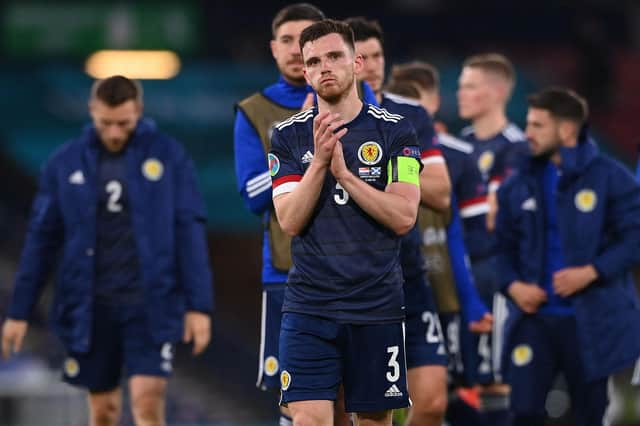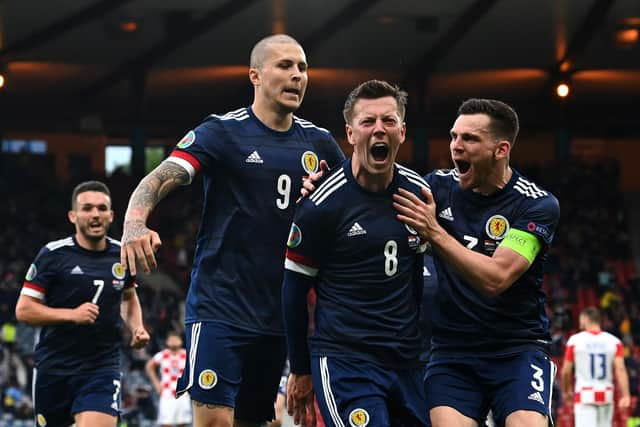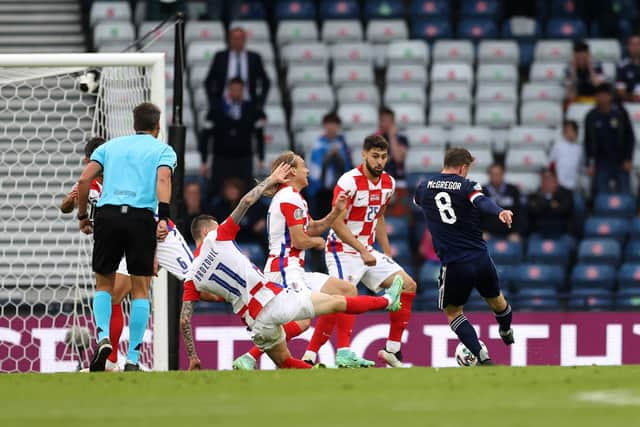One year on - bittersweet memories of Euro finals at Hampden underline onus on Steve Clarke to give Scotland another tournament summer


At a sun-kissed Hampden on the evening of June 22 last year, hope flickered brightly but briefly that Scotland could progress beyond the group stage of a major tournament finals for the first time ever.
When Callum McGregor scored three minutes before half-time, to cancel out Nikola Vlasic’s early opener for Croatia, a covid-restricted crowd of just under 10,000 inside the national stadium made the kind of noise worthy of a capacity audience as they dared to dream of the victory which the Scots needed to reach the last 16 of the delayed Euro 2020 finals.
Advertisement
Hide AdAdvertisement
Hide AdBut a Luka Modric-inspired Croatian side had different ideas. In the end, Scotland were outclassed in a 3-1 defeat which left them bottom of Group D and provided an all too familiar sense of deflation for the Tartan Army, one experienced by generations before them in the national team’s previous 10 appearances at World Cup and European Championship final tournaments.


Clarke had at least brought an end to Scotland’s painful exile from such a stage which stretched back to the 1998 World Cup in France. Yet for all the praise the manager and his squad received for their display in matching eventual runners-up England in a goalless draw at Wembley, it was difficult to avoid the conclusion Scotland had failed to maximise the favourable circumstances of playing their other two group games on home soil.
They were playing catch-up from the start after losing 2-0 to the Czech Republic at Hampden in their opener and, of the 24 nations taking part, ultimately only Turkey and North Macedonia had a poorer return of results.
Clarke still had credit in the bank, although that did not prevent many from questioning the timing of the Scottish FA’s decision to extend his contract last August. His previous deal was due to run until the conclusion of the 2022 World Cup qualifying campaign, one which Scotland had already started by dropping four points from their first three games against Israel, Austria and Faroe Islands.
When the Scots were soundly beaten 2-0 by Denmark in Copenhagen on matchday four, just a week after Clarke had signed the extension which will take him through to the end of the quest for a place in the Euro 2024 finals in Germany, critical scrutiny of the progress he was making in the job intensified.


Since then, Clarke has ridden a roller-coaster in the court of both public and pundits’ opinion. A six-match winning streak, culminating in the vibrant 2-0 win over the Danes at Hampden in November which secured a World Cup play-off place, took his approval ratings to a new high point.
But they have slumped in the subsequent six matches, a spell encompassing the limp 3-1 defeat at home to Ukraine in the World Cup play-off semi-final and calamitous 3-0 reversal in Dublin to an unremarkable Republic of Ireland in the UEFA Nations League.
While the only two victories over that most recent run of fixtures, both against a hapless Armenian side, have sustained Scotland’s hopes of guaranteeing a Euro 2024 play-off spot by way of their Nations League group, the reputation of Clarke and his squad remains bruised as far as many are concerned.
Advertisement
Hide AdAdvertisement
Hide AdMost pertinently for the manager, however, his employers do not share those doubts. Ian Maxwell, the chief executive of the Scottish FA, insisted after the governing body’s annual general meeting on Tuesday that there is simply ‘no conversation to be had’ over Clarke’s position.
Maxwell is certainly entitled to call for, as he described it, a more ‘balanced appraisal’ of Clarke’s performance in the role since he replaced Alex McLeish three years ago.
Regardless of how you like your numbers interpreted, Clarke boasts a pretty decent record over his 37 games at the helm so far. If you add those two dramatic Euro 2020 play-off penalty shoot-out successes over Israel and Serbia to the ‘W’ column in his ledger – many statistical resources regard such outcomes as a draw for the record books – he currently has a win percentage of 51.35. That bears favourable comparison to the vast majority of his predecessors as Scotland boss.
Clarke’s next challenge is to come good on his promise, made immediately after that 3-1 defeat against Croatia, that ‘we will make sure it’s not 23 years until we go to our next finals’.
When he next gathers his squad for the conclusion of the UEFA Nations League campaign in September, with home and away matches against Ukraine either side of a Hampden clash against Republic of Ireland, Clarke will look to reset and regather momentum. In addition to securing the insurance of that Euro 2024 play-off place, topping the Nations League group would also earn Scotland second-seed status for the main qualifying draw which will go ahead in Frankfurt on October 9.
The return of influential players such as Kieran Tierney and Ryan Jack, who both missed the recent international window because of injury, could aid Clarke in restoring balance and rhythm to a Scotland side which too often appeared disjointed and uncertain in those demoralising defeats at the hands of Ukraine and the Irish.
As the first manager to lead Scotland to a major finals for almost a quarter of a century, Clarke has earned the unequivocal backing he received from the Scottish FA this week. But as the memories of Euro 2020 fade further into the distance, the pressure is now firmly on to deliver another tournament summer to an expectant Tartan Army.
Comments
Want to join the conversation? Please or to comment on this article.